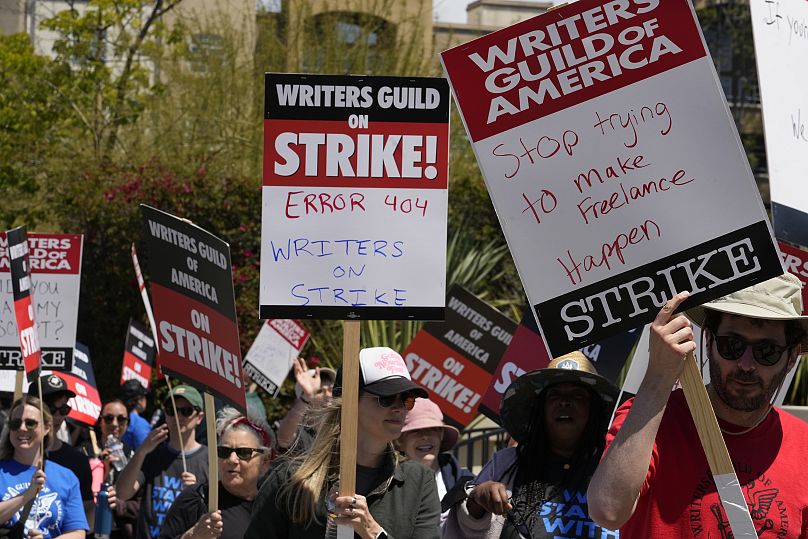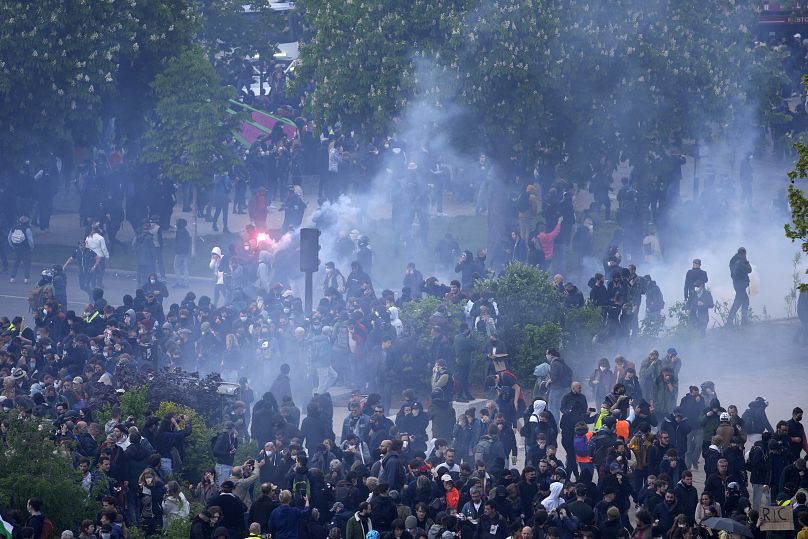The WGA strikes feel like a rare example of union power in the US. Why do we hear so little about equivalent unions in Europe?
The Writers Guild of America (WGA) Strikes that started on 2 May this year are yet to come to a satisfying resolution for the thousands of writers who have taken a stand against the Alliance of Motion Picture and Television Producers (AMPTP) over issues such as streaming residuals and AI.
In the process of striking, the WGA has put much of Hollywood on standstill. The picket line is an almost sacred barrier among the creatives of the industry, with actors and directors standing side-by-side with the writers, while productions have been stalled from development stage to shooting.
With over 11,500 writers taking part in the strike, it’s the biggest WGA action since the writers strike that took place between 2007 and 2008. So many creatives taking a stance against the profiteering streaming companies that are seeking to devalue their work is a refreshing sight. It’s also a very unusual one in the US.
Compared to Europe, the US isn’t known for strikes. The French, for example, are so ready to advocate for their working rights that strikes are joked about as more common than working in other countries. In truth, the French approach to striking is an impressive one, ceaselessly baring their teeth whenever a benefit – such as Emmanuel Macron’s recent pension reforms – comes under attack.
Similarly, the UK has been rocked in recent months by waves of strikes across almost every public industry – including train drivers, paramedics, nurses, teachers, firefighters and civil servants themselves – in opposition to a decade’s worth of state underfunding by the incumbent Conservative Party.
Yet on the other side of the Atlantic Ocean, such strike actions are comparatively unheard of. Private companies see irregular strikes – New York Times journalists walked out en masse for the first time in 40 years last December – but strikes across industries backed by unions are less common. Part of this comes down to the different approach to labour unions in the US compared with most European countries.
Sector-wide vs. Private industry
Typically in the US, to be a part of a labour union that will protect you against your company, the union will be formed in-house. This means that the union will only represent the employees of that specific company.
With US unions frequently existing only within the walls of the private company, there is a monetary incentive for higher-level executives to suppress union membership and its powers.
In Europe, most unions represent sectors instead of companies. Take journalism, for example. In the UK there is the National Union of Journalists (NUJ). If you’re a part of the NUJ, it doesn’t matter what company you work for; they can’t exploit you if you’re doing journalistic work for them.
This being the common way European unions work compared to US unions makes the work of the WGA more striking. It’s exactly the kind of union that is unusual in the US – one that represents a sector instead of a single company’s employees.
There are still labour unions that function like the European ones in the US – the Teamsters truckers unions being a particularly notable one – but participation in them is less frequent than in European countries.
As writing for screen or television is largely a role taken on by freelancers, the fact the WGA can back up this creative career is refreshing. Thousands of writers standing up to the capitalist urges of streaming media to deprive a creative role of its worth is a heartwarming story to anyone in a creative field.
Who protects the Europeans?
How then, do European writers fare when it comes to their rights? Are there similar protections and unions fighting for their corner?
“The WGA is right to stand up in the US, since American script writers are not as well protected as European script writers,” says Basil Ader, a lawyer for the firm August Debouzy.
Considering one of the main contentions of the WGA strikes – that production companies might opt to replace writers with AI or supplement them with the technology, Ader suggests it would be harder to do in Europe.
“Under French law, scriptwriters are considered authors, which gives them several privileges related to their moral rights, in particular the right of respect for their work, which means that they cannot be forced to modify their creation against their will.”
Producers can add co-authors to them when this is provided for in the contract, but today there is nothing yet, even at the European level, about the possibility of adding additions made by AI.
“French script writers are therefore protected by their ‘moral rights’, and by the fact that nothing in the production contracts would authorise producers to substitute their creations with AI,” Ader adds.
In France, there are multiple authors societies that a screenwriter would be able to join, including the Society of Dramatic Authors and Composers (SACD) and the Civil Society of Multimedia Authors (SCAM). Additionally, Ader points out that European authors outside of France will be protected by similar laws thanks to the Berne Convention, an international agreement on the ways to protect artistic works.
The UK also has similar writers unions to the WGA, SACD and SCAM. Its own Writers’ Guild of Great Britain (WGGB) has represented writers in the UK since its inception in 1959.
The WGGB negotiates agreements on pay with major British industry players like the BBC in TV and the National Theatre for stage works. They also provide other benefits like contract vetting and a pension scheme to its members.
While industry standard agreements with major organisations like the UK’s BBC are beneficial to all writers, only WGGB members have access to benefits like pensions. Where the WGGB and the WGA differ is that joining the WGGB is entirely optional. By comparison, the WGA is such a powerful union in the US that it is practically impossible to get a writer working for a production without them already being a member. This is where it gets its strength to mount huge campaigns like the current strikes.
The WGA has already stated that although it can’t discipline non-members for strikebreaking, it can permanently bar them from ever joining the WGA. As part of the WGA’s agreements require US production companies to only hire WGA writers, breaking the strike now would effectively blacklist them.
Nonetheless, unions in Europe are supportive of the WGA strikes. After all, many British writers work in the US and are just as prone to exploitation as their American colleagues.
On 11 May, WGGB Treasurer Gail Renard was one of a number of writers who staged an impromptu protest outside the Brussels office of the Motion Picture Association (MPA) in solidarity with the WGA.
“As the MPA is made up of some of the same companies as the AMPTP, it seemed the perfect opportunity to show our solidarity with our sister guild and their members in the US," said Renard.
"Writers guilds and unions across the world are flexing their collective muscle to face down the existential threat to our livelihoods that has taken our US colleagues out on strike. This is just the beginning. And we’re a creative bunch, so when the MPA invited execs up on the roof to see the sunset we thought we’d spoil the view!”













